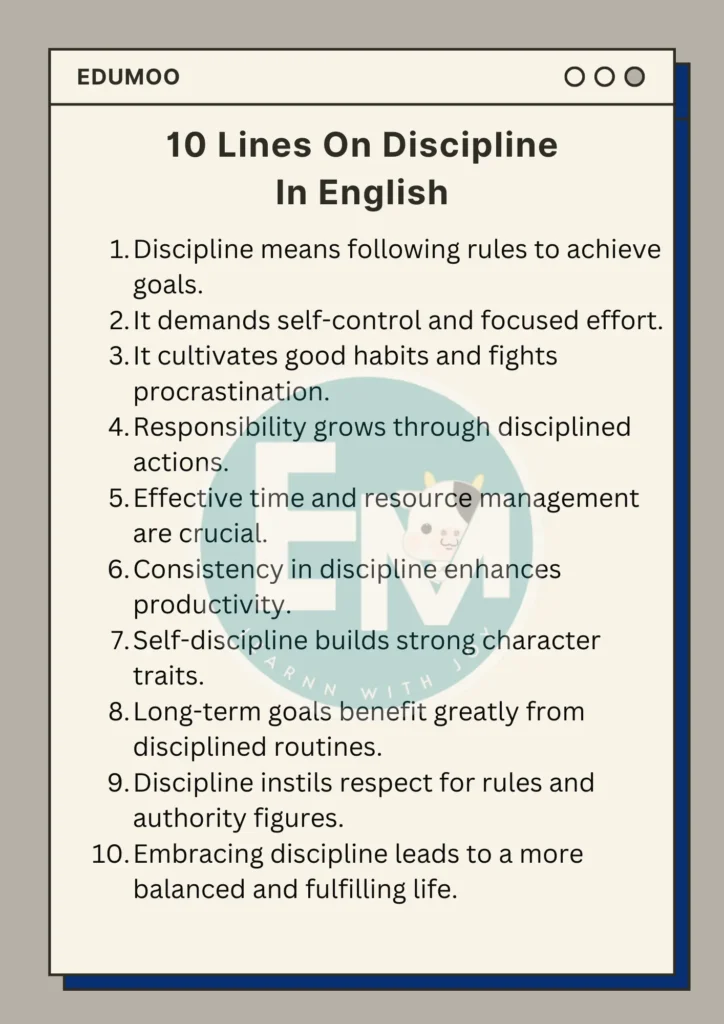Discipline is a vital aspect of life that helps us stay focused and achieve our goals. In these 10 lines on discipline, we explore how discipline fosters responsibility, organisation, and self-control. Understanding its importance can guide us in maintaining consistency and success in various aspects of life. It shapes our habits and attitudes, paving the way for personal growth, accomplishment, and a balanced lifestyle.
10 Lines On Discipline In English
- Discipline means following rules to achieve goals.
- It demands self-control and focused effort.
- It cultivates good habits and fights procrastination.
- Responsibility grows through disciplined actions.
- Effective time and resource management are crucial.
- Consistency in discipline enhances productivity.
- Self-discipline builds strong character traits.
- Long-term goals benefit greatly from disciplined routines.
- Discipline instils respect for rules and authority figures.
- Embracing discipline leads to a more balanced and fulfilling life.

Essay On 10 Lines On Discipline In English In 300 Words
Discipline is essential for success in life. It involves following a set of rules or routines to achieve specific goals. Whether in academics, work, or personal life, discipline plays a crucial role in shaping behaviour and outcomes.
Firstly, discipline requires self-control and focused effort. It means adhering to a plan or schedule even when faced with distractions or challenges. For students, this could mean studying regularly and completing assignments on time. In the workplace, discipline ensures that tasks are completed efficiently and deadlines are met.
Secondly, discipline fosters good habits and helps combat procrastination. By establishing consistent routines, individuals develop habits that contribute to their personal and professional growth. For example, maintaining a regular exercise regimen requires discipline to overcome the temptation to skip workouts.
Moreover, discipline builds responsibility. It teaches individuals to take ownership of their actions and commitments. People who are disciplined are more likely to fulfil their responsibilities, whether at home, school, or work, which enhances their reliability and trustworthiness.
Discipline instils respect for rules and authority, contributing to a harmonious society. It is a cornerstone of achievement, guiding individuals to persevere through challenges and setbacks. Embracing discipline not only leads to personal success but also enhances one’s ability to adapt and thrive in various situations, ultimately shaping a well-rounded and resilient individual.
Furthermore, effective time and resource management are integral parts of discipline. Organising one’s time ensures that priorities are addressed promptly, leading to increased productivity and reduced stress. Discipline also encourages the efficient use of resources, both personal and organisational, optimising outcomes.
In conclusion, discipline is not merely about following rules but about cultivating habits that lead to success. It shapes character, enhances productivity, and fosters personal growth. By practising discipline in daily life, individuals can achieve their goals, fulfil responsibilities, and lead a more balanced and fulfilling life.
| Also Read: Good Manners 10 Lines In English |
Essay On 10 Lines On Discipline In English In 700 Words
Discipline is a fundamental principle that underpins success and personal development in every aspect of life. It encompasses more than just following rules; it involves self-control, consistency, responsibility, and effective time management. This essay explores the multifaceted nature of discipline and its profound impact on individuals and society.
At its core, discipline requires individuals to adhere to a set of rules or routines to achieve specific goals. It demands self-control, the ability to resist distractions, and the perseverance to stay focused on tasks. For instance, students who maintain disciplined study habits are more likely to excel academically because they allocate time effectively and avoid procrastination.
Moreover, discipline fosters the development of good habits. By consistently practising disciplined behaviours, such as regular exercise, healthy eating, or diligent work habits, individuals cultivate routines that contribute to their overall well-being and productivity. These habits not only improve immediate outcomes but also lay the groundwork for long-term success and personal growth.
The Components of Discipline
1. Responsibility: Discipline enhances responsibility by teaching individuals to take ownership of their actions and commitments. This accountability enhances their reliability and trustworthiness in both personal and professional relationships. Employers value disciplined employees who consistently meet deadlines and deliver high-quality work.
2. Time Management: Effective time management is integral to discipline. It involves prioritising tasks, setting goals, and allocating resources efficiently. Discipline ensures that individuals devote sufficient time to important activities while minimising distractions. By organising their time effectively, individuals can achieve more in less time and experience less stress in the process.
3. Respect for Rules and Authority: Discipline instils respect for rules and authority. It teaches individuals to navigate social norms and adhere to ethical standards, contributing to a harmonious society. Respect for rules ensures fairness and order in communities, promoting cooperation and mutual trust among individuals.
4. Decision-making and Integrity: Discipline enhances decision-making skills by cultivating self-control and logical thinking. Disciplined individuals make informed choices that align with their goals and values, reducing the likelihood of succumbing to impulsive behaviours or peer pressure. They maintain integrity and self-respect in challenging situations, upholding ethical standards in both personal and professional domains.
Benefits of Discipline
Beyond personal benefits, discipline plays a crucial role in achieving long-term goals. Whether pursuing academic achievements, career advancements, or personal aspirations, disciplined individuals are better equipped to overcome obstacles and persevere through challenges. They exhibit resilience in the face of setbacks, viewing them as opportunities for learning and growth rather than barriers to success.
Discipline also promotes lifelong learning and growth. It encourages individuals to seek continuous improvement and embrace challenges as opportunities for development. By maintaining disciplined study habits or professional development routines, individuals stay relevant and adaptable in today’s rapidly changing world.
Psychological and Social Impact
Discipline contributes to mental and emotional well-being. By maintaining consistent routines and prioritising tasks, individuals reduce stress and anxiety. They feel more in control of their lives, which enhances overall happiness and satisfaction. Discipline allows individuals to manage their time effectively, balancing work, personal relationships, and leisure activities without feeling overwhelmed.
Moreover, disciplined individuals often exhibit higher levels of self-confidence. They trust in their abilities to overcome obstacles and adapt to changing circumstances. This self-assurance stems from the knowledge that they have the discipline to persevere and succeed, even when faced with adversity.
Ethical Considerations
Discipline plays a crucial role in ethical decision-making. Individuals who practise discipline are more likely to uphold moral and ethical standards in their personal and professional lives. They consider the consequences of their actions and strive to make choices that align with their values, promoting integrity and trustworthiness.
Societal Impact
Furthermore, discipline extends beyond individual benefits to societal impact. In communities and organisations where discipline is valued, there is greater cohesion and mutual respect. Rules and regulations are adhered to, fostering fairness and equity for all members. This creates a supportive environment where individuals can thrive and contribute positively to collective goals.
In conclusion, discipline is more than a set of rules; it is a mindset and lifestyle that cultivates success, resilience, and ethical behaviour. By practising discipline, individuals enhance their personal effectiveness, build strong relationships, and contribute to a harmonious society. It is a fundamental skill that empowers individuals to achieve their aspirations and make meaningful contributions to the world around them. Embracing discipline is not just about achieving short-term goals; it is about fostering long-term habits that lead to a fulfilling and purposeful life.
Conclusion
Good manners are crucial for fostering respect and kindness in our interactions. Today, we explored the significance of good manners through 10 lines on good manners and two detailed essays. They help us show consideration for others and create positive social environments. Practising good manners leads to better relationships and a more harmonious society. Let’s remember that good manners make a difference in how we connect with others. Have a wonderful day!

